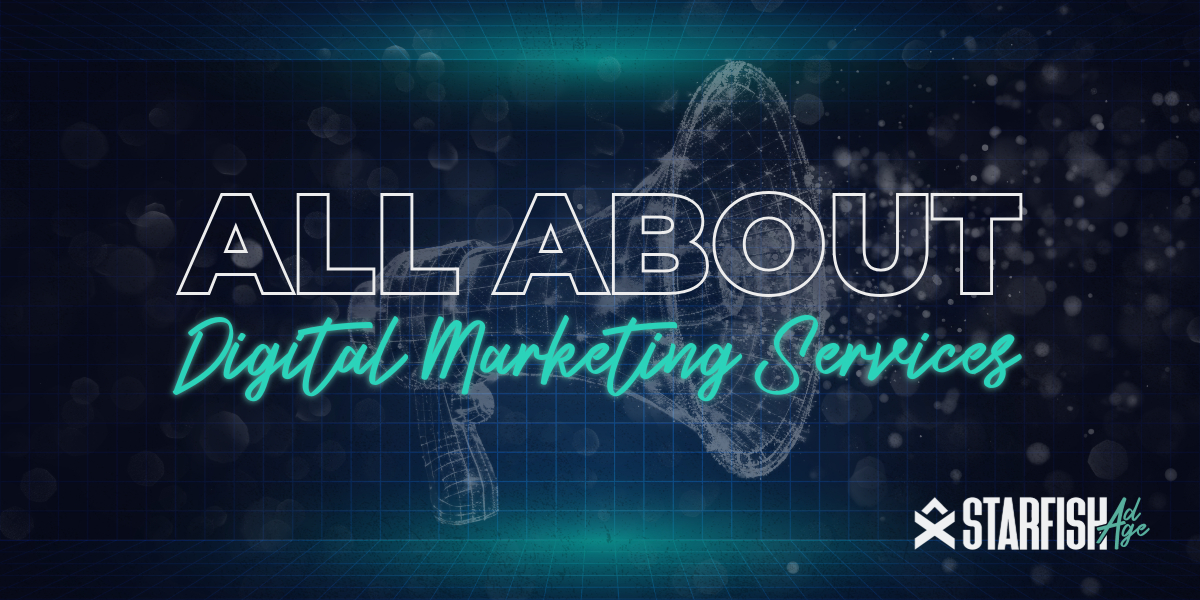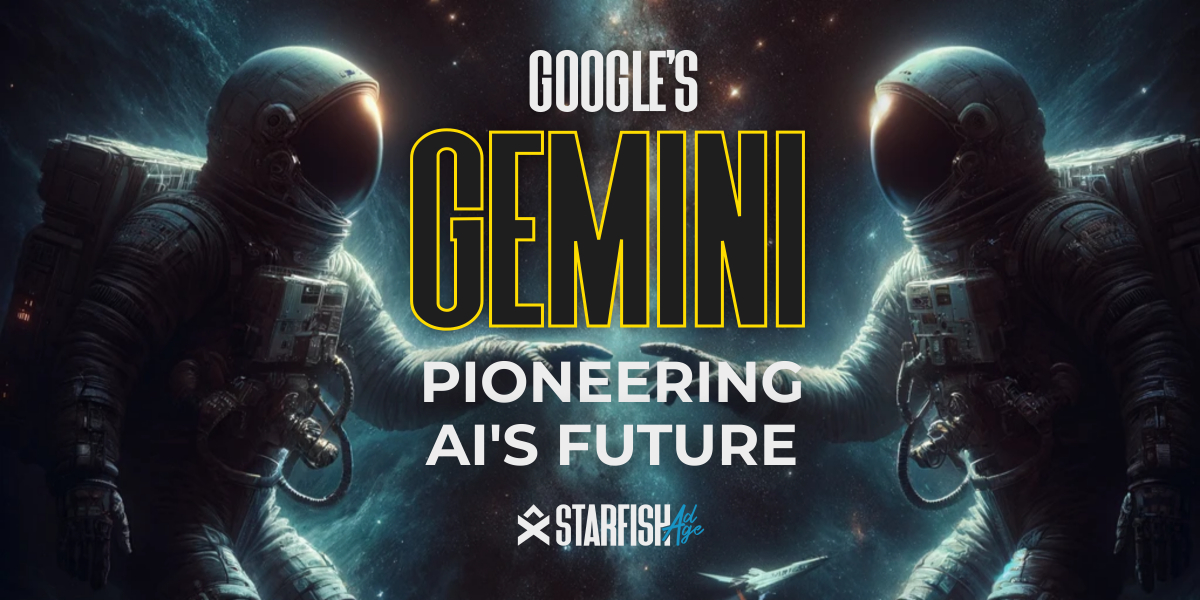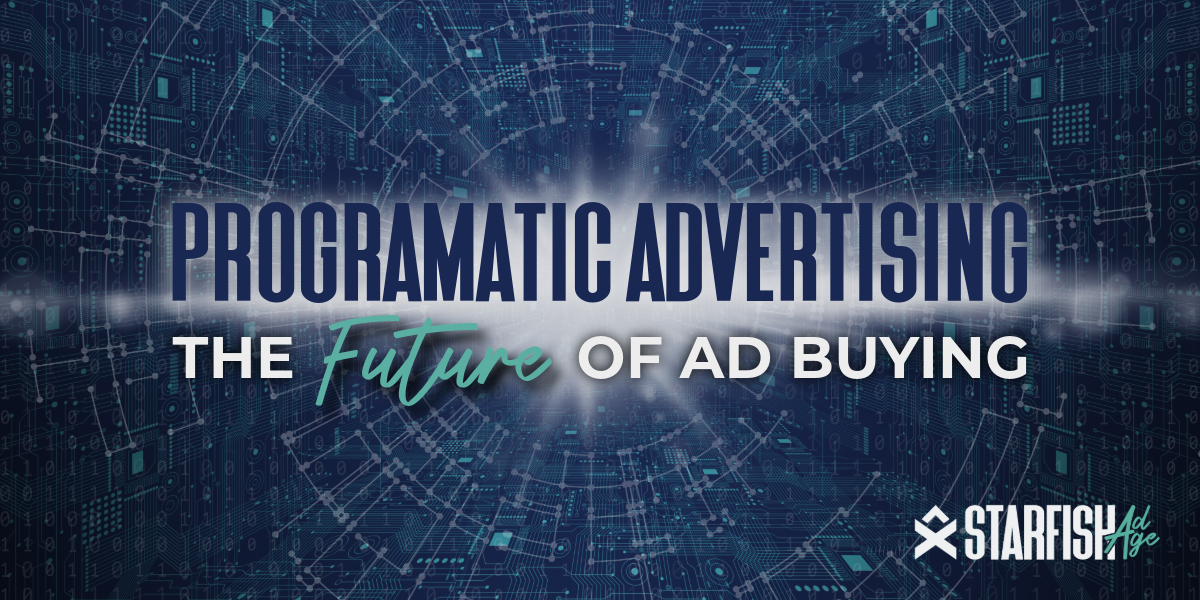
What Are The Different Digital Marketing Services?
Learn about SEO, PPC, social media marketing, content marketing, and more to drive traffic and conversions. Read now!

Google’s Gemini stands as a beacon of innovation in the AI world. This advanced AI model, developed by Google, showcases the company’s relentless pursuit of technological excellence.

Google’s journey towards developing Gemini, its latest AI model, is a testament to the company’s enduring commitment to innovation in the field of artificial intelligence. This initiative is far more than just the creation of a new artificial intelligence model; it represents a significant leap in the way technology integrates into our daily lives.
At the heart of Gemini’s development lies Google’s ambitious vision to redefine the boundaries of artificial intelligence. Google has always been at the forefront of AI research and development, and Gemini is a continuation of this legacy.
The company’s goal with Gemini is not merely to advance the technical capabilities of AI models but to transform how these models interact with and enhance human experiences. This vision is deeply embedded in Google’s broader mission to make information universally accessible and useful, leveraging AI as a key tool in achieving this.
Google’s approach to developing Gemini is driven by a desire to create technology that not only excels in performance but also positively impacts society. The company recognizes the potential of AI to solve complex problems, improve efficiency, utilize natural language processing, and unlock new possibilities in various fields, from healthcare to environmental sustainability.
Gemini is designed to be a catalyst in this process, offering innovative solutions, tools and insights that can lead to significant advancements in multiple domains. By focusing on both the technological and societal implications of AI, Google aims to ensure that Gemini contributes to a future where technology works in harmony with human needs and aspirations.

Gemini, Google’s groundbreaking AI model, stands out in the AI landscape due to its remarkable features and capabilities. This model is the culmination of advanced machine learning and algorithms, unparalleled processing power, and exceptional efficiency.
At the core of Gemini’s artificial intelligence prowess are its state-of-the-art learning algorithms. These algorithms are designed to mimic human learning processes, enabling Gemini to understand and interpret complex patterns and data with a high degree of accuracy.
Unlike traditional models that require extensive data to learn, Gemini’s algorithms are efficient and capable of grasping new concepts with minimal data input. This feature is particularly crucial in applications where data is scarce or where business processes are constantly evolving, allowing solutions from Gemini to adapt quickly to new information and scenarios.
Gemini’s processing power is an example of another key aspect that sets it apart. Equipped with the ability to handle and analyze massive datasets at unprecedented speeds, Gemini can perform complex computations and deliver insights in real time.
This capability is vital in today’s fast-paced world, where timely data processing and decision-making can be the difference between an organization’ success and failure. Whether it’s analyzing market trends, processing medical data, or managing large-scale enterprise logistics, Gemini’s processing power ensures efficiency and accuracy.

One of the most significant advancements in Gemini is its efficiency in learning and adapting. This model is designed to learn from its interactions and experiences, continuously improving its performance over time.
Gemini’s adaptive learning capability means it can not only handle current tasks effectively but also anticipate demand and prepare for future challenges. This feature is particularly beneficial in dynamic environments where conditions and requirements are constantly changing.
Gemini represents the pinnacle of AI capabilities, thanks to its advanced learning algorithms, computer vision, unmatched processing power, and efficiency in adapting to new information. These features make Gemini a versatile and powerful tool, capable of transforming various industries and enhancing our ability to solve complex problems. As we continue to explore the potential of Gemini, it’s clear that this AI model is not just an incremental improvement but a significant leap forward in the field of artificial intelligence.
DeepMind, a subsidiary of Alphabet Inc., stands as a beacon in the realm of AI research, consistently pushing the boundaries of what’s possible in artificial intelligence.
DeepMind’s journey in AI research is marked by a series of trailblazing innovations that have reshaped our understanding of artificial intelligence. One of its most celebrated achievements is AlphaGo, the AI program that defeated a world champion in the complex board game Go. This victory was not just a milestone in AI gaming; it demonstrated the potential of AI systems to tackle problems characterized by profound complexity and nuanced decision-making.
Another landmark contribution from DeepMind is its development of AlphaFold, an AI system that predicts protein structures with remarkable accuracy. This breakthrough in protein folding has vast implications for biological science, offering new pathways in drug discovery and a deeper understanding of life’s building blocks. AlphaFold’s success exemplifies DeepMind’s ability to apply artificial intelligence to solve real-world problems that have long been considered intractable.
DeepMind’s research and innovations play a complementary role to Google’s Gemini project. While Gemini pushes the frontiers in processing power, efficiency, and deep learning algorithms, DeepMind’s breakthroughs demonstrate practical applications of AI in diverse fields. This synergy between DeepMind’s applied research and Gemini’s technological advancements creates a robust ecosystem for AI development under the Alphabet umbrella.
DeepMind’s contributions extend beyond individual projects and companies; they have significantly influenced the overall growth of the AI field. By using new technologies, tackling complex challenges, and continuously innovating, DeepMind has expanded the horizons of artificial intelligence, inspiring researchers and developers worldwide. Its work not only advances current AI capabilities but also lays the groundwork for future discoveries, technologies and applications.
DeepMind’s role in pioneering AI research is indispensable, particularly in its synergy with Google’s Gemini project. Its trailblazing innovations and contributions have not only solved complex problems but have also inspired a new wave of AI research and development, cementing its position as a leader in the field of artificial intelligence.
The collaboration between DeepMind and Google’s Gemini project represents a convergence of two AI powerhouses, each bringing unique strengths to the table.
DeepMind’s expertise in AI research, particularly early work in areas like deep learning, neural networks, and reinforcement learning, complements Google’s technological prowess and infrastructure. While DeepMind excels in theoretical and applied AI research, Google’s Gemini project provides the necessary computational resources and platform integration to support these capabilities. This combination of cutting-edge research and robust technological support enables the development of more sophisticated, cost efficient, and scalable AI solutions.
The full value of collaboration between DeepMind and Google’s Gemini is evident in examples used in various joint ventures, services and projects. For instance, DeepMind’s breakthroughs in machine learning algorithms can be integrated into Gemini’s framework, enhancing its learning capabilities and processing efficiency. Similarly, Gemini’s advanced artificial intelligence model can leverage DeepMind’s research findings to improve its predictive accuracy and decision-making processes.
The synergy between DeepMind and Gemini also involves a cross-pollination of new ideas and technologies. DeepMind’s innovative approaches to AI problems can inspire new directions for Gemini, for example, while Gemini’s advancements in AI models and infrastructure can provide new tools and platforms for DeepMind’s research. This reciprocal relationship fosters a dynamic environment where innovation thrives, pushing the boundaries of what’s possible in AI.
The collaboration between DeepMind and Google’s Gemini accelerates the pace of AI research and its applications in the real world. By allowing data scientists to pool their resources and expertise, and develop artificial intelligence solutions that can have a transformative impact across various industries, from healthcare to business to environmental science.
The synergies between DeepMind and Google’s Gemini project are pivotal in shaping the future of AI. Their collaboration harnesses the strengths of both entities, creating a formidable force in AI development that promises to bring about a wide range of examples of groundbreaking innovations and practical applications that can benefit society as a whole.
Google’s Gemini, with its advanced AI capabilities, is set to make a profound impact across various industries.
In the context of the healthcare sector, Gemini’s potential value is particularly transformative. Its advanced algorithms and data processing capabilities can revolutionize various aspects of healthcare, leading to more accurate medical diagnoses, personalized treatment plans, and improved patient outcomes.
Gemini’s impact extends to support the business, enterprise, and commerce sectors, where it can see customers drive innovation, optimize operations, and enhance customer experiences.
Google’s Gemini is set to be a game-changer in various industries. Its ability to process and analyze data at an unprecedented scale and speed can transform healthcare, business, and commerce, for example, leading to more efficient business operations, cost-effective services, improved customer experiences, and innovative solutions that address complex challenges.
As we delve deeper into the realm of advanced AI technologies like Google’s Gemini, our focus on the importance of ethical and governance considerations in AI development becomes increasingly paramount.
Addressing Privacy Concerns in AI: The ethical landscape of AI, particularly in advanced systems like Google’s Gemini, places a significant emphasis on user privacy. As these AI models process extensive datasets, robust data protection measures become crucial.
Strategies for ensuring the security and confidentiality of user data include obtaining user consent for data usage, implementing encryption and anonymization techniques, and complying with global data protection regulations. Maintaining high privacy standards while harnessing AI capabilities is essential for user trust and regulatory compliance.
Mitigating Bias in AI Algorithms: Bias in AI, especially in comprehensive systems and solutions like Gemini, is a notable ethical concern. These biases, often originating from the training data, can lead to skewed outcomes.
Approaches to detect and reduce bias in AI models involve diversifying training datasets, implementing algorithmic fairness measures, and conducting regular audits to assess and rectify biases. Ensuring that AI systems operate impartially and equitably is crucial for their acceptance and effectiveness across diverse user groups.
Impact of AI on Employment: The advancement of technologies, such as Gemini, brings to light their potential impact on the job market. While AI can boost efficiency and innovation, artificial intelligence on employment also includes the creation of new job opportunities and the enhancement of existing roles, balanced against the challenges of workforce displacement. Emphasizing the need for reskilling and upskilling programs and exploring how AI can lead to new career paths are key to leveraging AI to augment human capabilities rather than replace them.
Implementing Ethical Frameworks: Google and DeepMind have been proactive in addressing ethical concerns in AI. We’ll examine the frameworks and guidelines they’ve implemented to ensure responsible AI development, focusing on transparency, accountability, and user-centricity.
Promoting Responsible AI Use: Both companies have initiatives to promote the responsible use of AI. This includes educational programs, collaborations with AI researchers, and partnerships with ethical bodies. We’ll delve into some examples of how these initiatives contribute to a broader understanding and implementation of ethical artificial intelligence.
Policy Advocacy and Global Collaboration: Google and DeepMind also engage in policy advocacy and global collaborations to support and shape the ethical landscape of AI. By working with governments, regulatory bodies, and international organizations, they aim to establish standards and best practices for ethical AI development and deployment.
As AI technologies and tools like Gemini continue to develop and evolve, addressing the ethical challenges and potential risks they present is crucial. Google and DeepMind’s commitment to ethical AI development sets a precedent in the industry, highlighting the need for responsible innovation that respects privacy, mitigates bias, and considers the context of its broader societal impact.
As we stand on the cusp of new advancements in AI, spearheaded by initiatives like Google’s Gemini, the future of AI presents a landscape brimming with potential and transformative possibilities.

Enhanced Learning and Adaptation: The evolution of machine learning algorithms is a cornerstone of AI’s future. With initiatives like Google’s Gemini, these algorithms are becoming increasingly sophisticated. This means these systems will not only process information more efficiently but also learn and adapt in ways that closely mimic human cognition. Such advancements could lead to AI models that understand context better, make more accurate predictions, and even exhibit creativity.
Human-Like Interaction and Decision-Making: As machine learning algorithms evolve, we can expect AI systems to engage in more human-like interactions and decision-making processes. This involves not just processing data but also understanding the nuances, emotions, and complex patterns within it. This level of sophistication will enable AI to provide more intuitive responses and solutions, making human interaction and interactions with AI more natural and effective.

Seamless Integration in Daily Activities: The future of AI is marked by its seamless integration into our daily lives. With advancements in technologies like Gemini, we can expect smart homes to become more intuitive, healthcare to become more personalized, and everyday gadgets to become more responsive to our needs. This integration will make AI an invisible yet indispensable part of our daily routines.
Personalization and Convenience: As AI becomes more integrated into our lives, it will offer unprecedented levels of personalization and convenience. From AI-powered personal assistants that understand individual preferences to smart systems that automate mundane tasks, the goal is to have technology to make life easier and more efficient. This integration will also extend to public services, making cities smarter and more responsive to citizens’ needs.
Revolutionizing Key Sectors: AI’s potential to revolutionize various industries is immense. In finance, artificial intelligence can enhance fraud detection, personalize banking services, and optimize investment strategies. In education, AI can offer personalized learning experiences and automate administrative tasks. In transportation, AI can improve safety, efficiency, and sustainability, from self-driving cars to optimized public transit systems.
Industry-Specific Solutions and Innovations: Each industry will witness unique AI-driven solutions and innovations. For instance, in healthcare, AI could lead to early disease detection and tailor-made treatment plans. In retail, AI can enhance the customer experience through personalized recommendations and efficient supply and demand chain management. In manufacturing, AI can optimize production lines and predict maintenance needs. These industry-specific applications of AI will not only improve services but also drive economic growth and innovation.
The integration of AI in environmental conservation opens a realm of possibilities for addressing some of the most pressing ecological challenges of our time. AI can be leveraged to make a tangible impact in the fight against climate change and in promoting sustainable practices.
AI for Climate Change Monitoring and Mitigation: AI’s potential in monitoring and combating climate change is immense. Advanced algorithms can analyze vast datasets from satellite imagery, ocean temperature readings, and atmospheric data to predict climate patterns and extreme weather events with greater accuracy. This predictive capability is crucial for early warning systems, helping communities prepare for and mitigate the effects of climate-related disasters.
Enhancing Natural Resource Management: AI can revolutionize the way we manage natural resources. By processing data from various sources, AI can help in efficient water management, optimizing agricultural practices to reduce water and fertilizer usage, and monitoring forest health to prevent deforestation. AI-driven analytics can also aid in wildlife conservation, tracking animal populations, and identifying threats to biodiversity.
Supporting Sustainable Practices: AI can play a pivotal role in advancing sustainable practices across industries. In the energy sector, AI can optimize renewable energy production, improving the efficiency of solar and wind farms by predicting weather patterns and energy demands. In urban planning, AI can contribute to the development of smart cities, where resource use is optimized and pollution is minimized. Additionally, AI can assist in waste management by sorting recyclables more efficiently and identifying areas where waste reduction can be maximized.
AI-Driven Environmental Policy Making: Beyond direct environmental applications, AI can assist policymakers in making informed decisions. By providing comprehensive analyses of environmental data and modeling the outcomes of various policy decisions, AI can help craft policies that are both effective and sustainable.
AI’s role in environmental conservation is not just about technological innovation; it’s about harnessing this technology to create a more sustainable and resilient world. As we continue to face global environmental challenges, AI offers a promising toolset to aid in monitoring, managing, and mitigating the impacts of these challenges, paving the way for a more sustainable future.
Personalized Learning Experiences: One of the most significant impacts of AI in education is its ability to create and to personalize learning for each student. AI systems, like those developed in projects such as Gemini, can analyze a student’s learning patterns, strengths, and areas for improvement.
This data can then be used to tailor educational content to suit each student’s unique learning style and pace. For instance, if a student excels in visual learning, the AI can present more graphical content to enhance understanding. This level of personalization ensures that each student receives an education that is best suited to their individual needs, thereby maximizing their learning potential.
Accessibility and Inclusivity in Education: AI can also make education more accessible and inclusive. For students with disabilities or those in remote areas with limited access to quality education, AI can provide necessary accommodations and resources.
For example, AI-powered tools can convert text to speech for visually impaired students or provide real-time language translation for non-native speakers. This inclusivity ensures that all students, regardless of their physical location or abilities, have equal access to quality education.
Automated Grading and Feedback: AI can assist educators by taking over time-consuming tasks like grading. By using AI for automated grading of quizzes and assignments, teachers can focus more on teaching and less on administrative tasks. Furthermore, AI can provide instant feedback to students, allowing them to understand their mistakes and learn from them immediately, which is crucial for effective learning.
Enhancing Classroom Engagement: AI tools can also transform the traditional classroom environment. Interactive AI tools can create more engaging and immersive learning experiences. For example, AI-driven simulations and educational games can make learning more interactive and fun, especially in subjects like science and mathematics, where practical application is key.
Predictive Analytics in Education: AI’s predictive analytics can play a crucial role in identifying students who might be at risk of falling behind. By analyzing patterns in a student’s performance, attendance, interest, and engagement, AI can alert educators to potential issues before they become serious. This early intervention can be crucial in providing the support and resources needed to help students succeed.
Curriculum Development and Enhancement: AI can assist in curriculum development by analyzing current educational trends, student performance data, and future job market requirements. This analysis can help educators and institutions develop curricula that are more relevant, up-to-date, and aligned with the skills required in the modern workforce.
The integration of AI in education promises to create a more personalized, accessible, and cost-effective learning experience for students. By supporting educators, creating content, enhancing engagement, and providing predictive insights, AI has the potential to revolutionize the educational landscape, making it more adaptable to the needs of the 21st-century learner.
Personalization at Scale: AI, particularly models like Gemini, is transforming digital advertising by enabling personalization at an unprecedented scale. By analyzing consumer data, AI can tailor advertisements to individual preferences, behaviors, and interests. Allowing them to continually reach their target audience. This level of personalization enhances user engagement, making ads more relevant and effective.
Predictive Analytics for Targeting: AI-driven predictive analytics are a game-changer in digital advertising. By forecasting consumer trends, interests, and behaviors, AI helps advertisers target their campaigns more effectively. This predictive power means businesses can anticipate market shifts and adjust their strategies accordingly, ensuring their advertising efforts are always one step ahead and they continually generate interest.
Automated Ad Creation and Optimization: The automation capabilities of AI streamline the ad creation process. AI can generate and test various ad formats, copy, and designs, quickly identifying the most effective combinations. This automation not only saves time and resources but also optimizes ad performance, maximizing the return on investment.
Real-Time Bidding and Ad Placement: AI enhances programmatic advertising through real-time bidding and automated ad placement. By analyzing vast amounts of data in real time, AI can make instantaneous decisions on where and when to place ads for optimal visibility and engagement. This efficiency in ad placement ensures advertisers get the most value from their ad spend.
Enhanced Customer Insights through Data Analysis: AI models like Gemini excel in extracting valuable insights from complex data sets. In digital advertising, this means a deeper understanding of customer journeys and behaviors. These insights enable advertisers to craft more effective marketing strategies and improve the overall customer experience.
Fraud Detection and Prevention: AI plays a crucial role in detecting and preventing ad fraud. By analyzing patterns and identifying anomalies, AI systems can flag fraudulent activities, protect advertisers’ budgets, and ensure genuine consumer engagement.
Content Optimization for SEO: AI’s ability to analyze and predict search engine algorithms makes it an invaluable tool for SEO. It and companies can optimize content to rank higher in search results, driving organic traffic and increasing visibility for advertisers.
Chatbots for Enhanced Customer Interaction: AI-powered chatbots are revolutionizing customer interaction in digital advertising. They provide instant responses to customer queries, improving engagement and customer satisfaction. These chatbots can also gather valuable data, informing future advertising strategies.
AI’s role in digital advertising is multifaceted and transformative. From personalization to predictive analytics, automated ad creation, and enhanced customer insights, AI is not just changing how ads are created and delivered; it’s redefining the entire advertising landscape. As AI technology continues to evolve, its impact and value on digital advertising will only grow, offering more sophisticated, efficient, and cost-effective advertising solutions.
The future of AI, particularly with the development of projects from companies like Gemini and the ongoing research at DeepMind, is poised to bring about an infinite number of groundbreaking innovations and applications. From transforming industries to becoming an integral part of our daily lives, the potential of AI is vast and ever-expanding, promising a future where technology and the human experience are seamlessly intertwined.
As we conclude our exploration of Google’s Gemini and DeepMind’s groundbreaking contributions to AI, it’s clear that we stand at a pivotal moment in technological history.
Collaborative Approach to AI Development: The evolution of AI technologies like Google’s Gemini and DeepMind’s innovations is not solely in the hands of technologists. It demands a collaborative approach that brings together policymakers, industry experts, academics, and the general public.
This inclusive strategy is essential to ensure that AI development aligns with societal needs and adheres to ethical standards. By incorporating diverse perspectives, we can create AI systems that are not only technologically advanced but also socially responsible and beneficial.
Public Engagement and Education in AI: As AI becomes increasingly integrated into various aspects of our lives, it’s imperative to engage and educate the public about its capabilities, limitations, and potential impacts. Understanding AI is crucial for everyone, not just specialists, as it influences public opinion, shapes policy decisions, and guides the ethical use of AI technologies. Public awareness and education can foster a more informed discourse around AI, leading to more democratic and inclusive decision-making processes in its development and application.
Navigating Challenges and Opportunities: The path forward with AI, particularly with groundbreaking projects like Gemini and DeepMind, is laden with both challenges and opportunities. We must be mindful of ethical dilemmas, privacy concerns, and the necessity for robust regulatory frameworks. Addressing these challenges requires a concerted effort from all stakeholders involved in AI development and governance. By acknowledging and confronting these issues, we can harness AI’s full potential while mitigating its risks.
Embracing AI with Responsibility and Foresight: As we embark on this new era of enterprise AI, it’s crucial to approach it with both enthusiasm and caution. The potential of AI to transform industries and improve lives is immense, but so are the responsibilities that come with it.
We must continue to invest in research, consider ethical implications, and take proactive steps to ensure AI’s development and deployment benefit society at large. Embracing AI with foresight involves anticipating future challenges and opportunities, preparing for them, and ensuring that AI advancements contribute positively to the well-being of humanity.
The advancements in the science of AI represented by Google’s Gemini and DeepMind are not just technological feats; they are catalysts for a broader revolution in how we live, work, and think. As we embrace these changes, it’s imperative to do so with an informed, responsible, and collaborative approach, ensuring that AI serves as a force for good in our increasingly interconnected world. This journey into the future of AI, marked by such innovations, demands a balanced perspective that appreciates the potential of AI while being acutely aware of its challenges.
It’s about harnessing the power of AI to enhance human capabilities and address global challenges, from healthcare to environmental conservation. At the same time, it’s crucial to address ethical concerns, mitigate biases, further human rights and ensure privacy and security in AI applications. The role of society in shaping AI’s future cannot be overstated.
It requires active participation from all stakeholders—technologists, policymakers, industry leaders, and the public—to guide AI development in a direction that aligns with our collective values and aspirations. As we navigate this transformative era, the focus should be on creating AI solutions that are not only innovative but also inclusive, equitable, and sustainable.
The advancements made by Google and DeepMind are just the beginning of a fascinating journey, one that holds the promise of a more intelligent, efficient, and ethical future. Embracing AI with foresight and responsibility will be key to realizing its full potential while safeguarding our societal and ethical norms.

Learn about SEO, PPC, social media marketing, content marketing, and more to drive traffic and conversions. Read now!

Learn how to select the best digital marketing agency for your small business, the benefits of hiring an agency, and tips for maximizing your online presence.

Learn how to leverage TikTok advertising, ad formats, targeting options, and best practices to increase brand awareness, and drive sales.

Learn about Connected TV (CTV) ads, their benefits, and how they work. Understand programmatic CTV advertising for effective digital marketing campaigns.

Discover the benefits of programmatic advertising, an automated method of buying digital ad space that enhances targeting, efficiency, and campaign performance.
All Rights Reserved | Starfish Ad Age LLC | 2023 | Privacy Policy